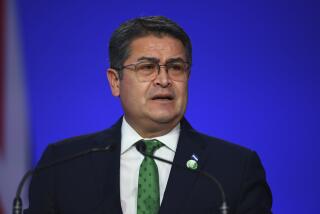Conviction in Argentina’s ‘Dirty War’
- Share via
MADRID — A Spanish court convicted a former Argentine naval officer of crimes against humanity Tuesday and sentenced him to 640 years in prison for throwing 30 prisoners from planes during his country’s “dirty war” more than two decades ago.
Argentines who lost loved ones in the campaign against dissent hugged each other and cried after the landmark ruling against 58-year-old Adolfo Scilingo.
The verdict closes Spain’s first trial under a law that allows crimes against humanity to be tried in the country even if they are alleged to have been committed elsewhere.
“With Scilingo’s conviction, we’ve sent a worldwide message to all dictatorships and people who have committed genocide, telling them that they are not safe wherever they are,” said Juan Diego Botto, whose father was killed on one of the flights.
The three-judge panel said in its 200-page ruling that Scilingo was guilty of taking active part in the Argentine junta’s drive to crush leftist dissent during the 1976-83 military dictatorship, noting that he was on two of the execution flights.
Scilingo did not react to the verdict, but took notes as the sentence was read. His lawyer said he would appeal.
Scilingo came to Spain voluntarily in 1997 to testify before a judge investigating atrocities allegedly committed by military regimes in Argentina and Chile. He admitted participating in two flights during which 30 people were thrown into the Atlantic Ocean. He said he knew of other atrocities that occurred when he was based at the Buenos Aires Navy School of Mechanics, a notorious torture center.
National Court Judge Baltasar Garzon, who was investigating the alleged crimes, subsequently indicted Scilingo.
During the trial, which included testimony from torture survivors, Scilingo insisted that he fabricated his testimony to trigger an inquiry into the dirty war. His lawyer, Fernando Martinez Morata, said Scilingo was a scapegoat.
More to Read
Sign up for Essential California
The most important California stories and recommendations in your inbox every morning.
You may occasionally receive promotional content from the Los Angeles Times.










